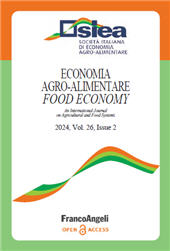Alternative Food Networks in Afghanistan : the Role of Collaborative Agribusiness in Food Security
167-187 p.
Afghanistan has been an understudied country despite its current difficulties stemming from political conflict for decades and its adverse impact on the country and society, such as food security. This article presents firsthand findings on the potential of collaborative agribusiness initiatives as part of Afghanistan's food system to address food security challenges.These embody an emerging body of literature known as alternative food networks, as part of the Slow Food movement that prioritizes community wellbeing, as a solution to food security. Findings are drawn from selected interviewees who are key Afghan stakeholders, ranging from farmers to experts in the agribusiness sector, relating to collaborative agribusiness initiatives which play a crucial role in fostering food security in Afghanistan. Specifically, it argues that through collaborative initiatives among farmers and the integration of marginalized groups, agricultural productivity increases, which ultimately leads to better food security.
Three components emerge resilience, resource enhancement and revelation (3Rs) as the conceptual contribution. This approach of alternative food network improves access to markets and resources, particularly for smallholder farmers in remote regions and provinces. [Publisher's Text].
Forma parte de
Economia agro-alimentare : XXVI, 2, 2024-
Artículos del mismo número (disponibles individualmente)
-
Información
Código DOI: 10.3280/ecag2024oa17272
ISSN: 1972-4802
KEYWORDS
- Afghanistan, Alternative food networks, alternative food systems, collaborative agribusiness, slow food movement


